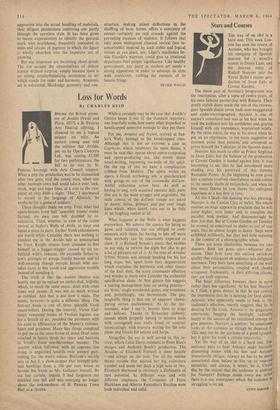Loss for Words
By CHARLES REID
Three thoughts made me testy. First, what bad opera-houses town hall 'assembly rooms' make. Second, my own rate bill, doubled by re- valuation. Third, whether, in view of the recent revival at Sadler's Wells of Attila, so inept and banal a score in parts, further Verdi exhumations are worth while. Certainly there was nothing to comfort me in the Aroldo tale as summarised by Toye. Knight returns from crusades to find himself in a hugger-tnugger caused by (a) un- faithful wife's remorse, (b) excitable father-in- law's attempts to avenge family honour and (c) well-meaning though myopic hermit who mis- takes faces at five .yards and aggravates muddle instead of mending it.
The truth is that the Aroldo libretto was hastily run up to replace an earlier dud, Stiftelio, which, to much the same music, dealt with other times and people. It was not so much written as cobbled. And that is just how it reads. The music, however, is quite a different thing. The first-act finale is one of those splendid Verdi steam-rollers. During the interval, Victor Gol- lancz, venerated leader of Verdian legions, out for a breath of air, pounded the pavement with his cane in affirmation of the Master's richness, heart and grandeur. Many fine things conspired to put me in the same frame of mind. Duel scene couched in heroic thirds for tenor and baritone in Verdi's finest neo-Meyerbeer manner. The quartet which followed, with its soprano line rising in anguished tendrils over sombre part- writing for the men's voices. Baritone's suicide aria in Act 3, a show-stopper that brought jubi- lant bawlings from a 100 per cent house as fervent for Verdi as Mr. Gollancz himself. By the last curtain, indeed, I had forgotten my doubled rate bill and was worrying no longer about the awkwardness of St. Pancras Town Hall as a theatre. While it certainly may be the case that AroIdo's libretto keeps it out of the standard repertory, one hopefully notes how many other imperfect or handicapped scenarios manage to stay put there.
For me, Ariadne auf Naxos, revived at Sad- ler's Wells, belongs to the handicapped class. Although this is not so extreme a case as Capriccio, which belabours the same theme, it must be said that operas about opera-composing and opera-producing are, like novels about novel-writing, ingrowing toe-nails of the spirit. On the top of this we have a complication cribbed from Moliere. The opera within an opera, a Greek mythology job, is spatchcocked with goings-on out of the commedia dell'arte. Awful unfairness arises here. As well as having to sing, with seasoned operatic skill, parts that are in the main scrappy and ungrateful, the male comics of the dell'arte troupe are asked to dance, mime, grimace and put over laugh lines which, when heard, turn out to be little or no laughing matter at all What happens at the Wells is what happens everywhere. We admire the comics.for being so game and talented, but are obliged to com- miserate with them for having to bite off more than anybody can be reasonably expected to chew. It is Richard Strauss's music that enables us not only to survive the night but also to get a lot of pleasure out of it. At the time of Ariadne (1916), Strauss was already heading for his last long slope; but, apart from fatty degeneration which overtakes the harmonic and other tissues of the final duet, the score commands affection and wonder at every turn. Consider the orchestral specification alone. At first glance this suggests_ a touring management bent on saving pennies— six 'firsts,' single woodwind, piano, one trombone and, perturbingly, one harmonium. The gay, laughable thing is that out of apparent cheese- paring comes enchantment. As to the har- monium, what I say is, heaven bless its stops and bellows. Thanks to Straussian alchemy, sbunds which properly belong to mission halls with corrugated zinc roofs blend or contrast intoxicatingly with bravura writing for the solo piano and frivols for celesta and harps.
Altogether the ear is well served in this re- vival, which Colin Davis conducts to Peter Rice's designs and Anthony Besch's production. The Ariadne of Elizabeth Fretwell is sheer bounty —and always on the note. For all the sudden throat trouble that marred her big coloratura number and made her duck a high note or two, Elizabeth Harwood is obviously a Zerbinetta of rare potential. In different ways and with different emphases, the Composer of Joyce Blackham and Alberto Remedios's Bacchus were both individual and valid.


































 Previous page
Previous page